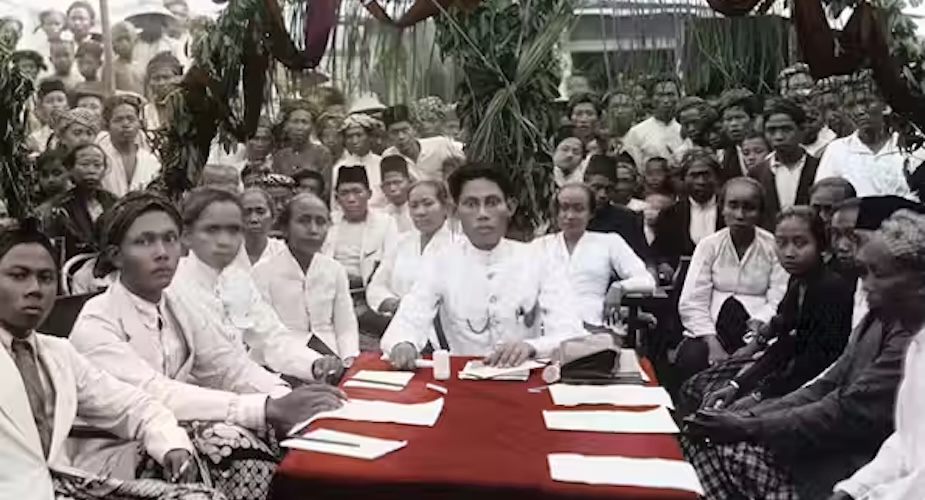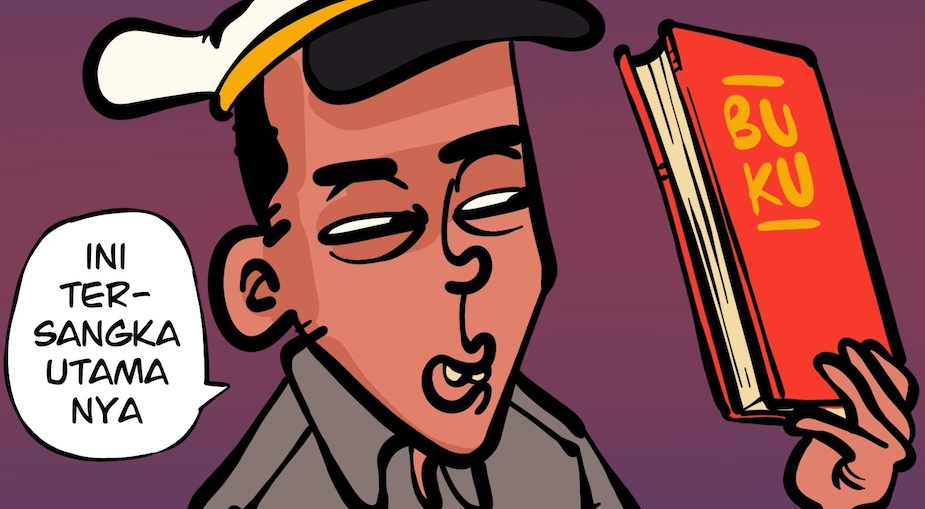Christianity, curly hair, and human dignity
Nico Schulte Nordholt
The two phenomena of ethnicity and ethno-nationalism are not restricted to West Papua. All over the archipelago they occur as a consequence of the present power vacuum in the 'centre' after Suharto's 32 years of centralistic and oppressive reign. Everywhere anti-Jakarta and, outside Java, anti-Javanese, sentiments can be noticed. To those who are not Papuan (or Acehnese, or any of the other ethnic groups now talking about seceding from Indonesia), these sentiments often sound dreadfully exclusive. Does this mean Indonesia is now inevitably headed away from earlier ideals of tolerance and diversity, towards narrower concepts of nationhood based on blood and religion?
The Dutch scholar Jan Nederveen Pieterse pointed out that an ethnic discourse is profoundly affected by macro processes such as post Cold War politics. For Indonesia, one can add to this the impact of the Asian economic crisis since 1997, which has led to the present Kristal(total crisis). IMF and World Bank policies such as 'the retreat of the central state', 'decentralisation', 'privatisation' and 'democratisation' are also driving politics in an ethnic direction.
The republic's national slogan of Diversity in Unity (Bhinneka Tunggal Ika) was intended in 1945 to express a unity (persatuan) based on a voluntary choice of belonging to the new republic of Indonesia. At that time there was great appreciation for the vast diversity of the republic. During Suharto's New Order, however, this national slogan shifted towards unity imposed from above (kesatuan). Ethnicity was reduced to folk customs, displayed on well-orchestrated TV performances.
Today the pendulum of ethnic diversity is shifting again, this time towards a kind of ethno-nationalism that causes many observers in and outside Indonesia to fear a complete falling-apart. I will show in a moment that I personally do not think the situation is that bad, but two regions, Aceh and West Papua, may indeed try to separate themselves from the republic.
'Being a christian'
When as a lecturer at a university in Java in the 1970s I first came to know students from what was then still called Irian Jaya, I discovered how diverse they really were. There were tensions especially between coastal and mountain Papuans. Moreover, individualism was deeply rooted. Even within one's own clan, creating co-operation was an uphill battle. But a number of things bound them together. They spoke Indonesian together. They all loved soccer. And 'being a christian' was important to them, especially when they experienced petty racism amidst their overwhelmingly Javanese and Islamic environment. They named the hostel where they lived 'Mansinam', after the small coastal village near Manokwari where the first missionaries landed in the nineteenth century. These things amounted to a Papuan ethnicity, which to them was not 'narrow' but broad and protective.
In the 1980s I helped the main Protestant church in Irian Jaya (GKI Irja) to develop some community development programs. I saw once more how 'being a christian' offered Papuans a new identity, lifting them above their own clan identity. Although separated by many Christian denominations, 'being a christian' gave them a self-respect that resisted the discrimination they experienced from the Indonesian authorities and the armed forces in particular. Even the distinction between Protestant and Catholic, elsewhere the source of much tension, appeared to be of minor interest.
Arnold Ap symbolised the severe discrimination most Papuans felt in the 1980s. This well-known Papuan anthropologist was killed by intelligence agents just before Easter 1984, on orders from the Jakarta headquarters. They saw him as the champion of a national liberation movement, and he therefore had to be eliminated. In fact he had only given Papuans back their self-respect, through church liturgy. He was a leader who bridged Papua's deep ethnic diversity. While himself from the coastal area, he equally supported the rights of the mountain people. The environment, and later in the nineties (entirely in Arnold Ap's spirit) human rights, were issues that rose above the ethnic divisions.
When the government announced in August 1983 that 750,000 households of transmigrants would be shipped to Irian Jaya, Papuans soon said: 'We will be no more than servants on our own soil', and: 'They wish to turn our curly hair into straight hair'.
To counter this widespread fear, the GKI Irja church synod thought it important to provide some hope for the future. Hence those plans for programs promising at least some kind of 'survival' as a group with their own identity. During the years that followed not many of those plans were realised. Church organisations did not have enough human capacity. Nevertheless, the churches did offer a shelter in which Papuans could experience their identity.
The churches, alongside several relatively small but influential NGOs, have similarly been vocal about the social cost of mining and forestry from the mid-eighties until today.
Emancipation
After the end of the Suharto regime these protests acquired a political meaning. The call for independence was first expressed openly in 1998. In June 2000, thanks to the tolerant attitude of the Wahid government at that time, a well-organised people's congress officially put forward the demand for independence to the government in Jakarta, although terms and conditions were negotiable.
Does this amount to a Papuan declaration of war on Indonesia, as Papuans dig in to fight for their own state, moreover one that is based on a narrowly racial and religious concept of Papuan ethnicity? I do not think so, at least not yet. Some leading Papuans have told me that in fact their main purpose was to win recognition of their human dignity, as well as full recognition from 'Jakarta' and the rest of the world of the grave injustice done to them by 'the treason of 1969'. In other words, they seemed to imply, their fight was for a better Indonesia rather than a separate Papua.
However, much will depend on how Jakarta now responds. Today, in May 2001, President Wahid is hostage to the Indonesian Armed Forces TNI, while the presidium of the people's congress is in jail. Possibly the present intelligence officers, like their predecessors who liquidated Arnold Ap in 1984, think that by 'decapitating' the leadership of a national movement they can enfeeble it. Meanwhile Wahid's likely successor, Megawati Sukarnoputri, leads a party that in all its statements about the regions beyond Java sounds centralistic and nationalistic rather than sympathetic to diversity. A government she leads may resort to increased repression in Papua.
Repression seemed to work in the eighties, at least at first sight. But now, nearly twenty years later, resistance against injustice is much more widespread. Besides the five leaders in jail, there are many more younger leaders who, in the spirit of Arnold Ap, are ready to stand up for the demands of the people. A policy of repression will only fuel the call for independence. Both within and beyond the church, these new leaders are at the same time rising above the boundaries of their own ethnic and religious groups and presenting themselves as representatives of a self-conscious Papuan nation in the making.
Nevertheless, much about Papuan self-consciousness remains fluid and open to different possibilities. It would be premature to jump to the conclusion that it is becoming a narrow and exclusive Papuan ethno-nationalism, completely rejecting Jakarta and threatening non-Papuans living in Papua with expulsion. Just as Papuan ethnicity has proved generous and inclusive towards Papuans from all over this vast territory, it has the potential to expand and embrace others too.
Nor is the concept of nationalism necessarily exclusive. All over the world, nationalism is 'Janus-faced' - it can be liberating and inclusive, or chauvinistic and exclusive. When nearly all Papuans loudly express the call for 'merdeka', that in itself is not sufficient to know what kind of freedom is envisaged. Does it mean 'emancipation' and 'liberation from injustice' - that is, to be accorded the same respect as all others within the one Indonesian nation? Or does it rather mean 'chauvinism' and 'domination' - that is, by Papuans against non-Papuan 'others', against 'Indonesians' and those who represent them locally, in particular traders and transmigrants?
Papuans who are (aspiring) state officials perhaps intend their call for 'merdeka' to be heard in a narrow ethno-nationalistic sense, meaning they want a state of their own where only Papuan Christians will be citizens. They say this in reaction against a Jakarta they see as the colonial centre. Their history of Dutch colonial rule, de facto, lasted only about fifteen years, but they endured the New Order for more than thirty years. For them, Papua must now coincide with the borders of the province of Irian Jaya as a distinct administrative unit.
It may turn out, however, that provided justice is done to the Papuan population the call for 'merdeka' will by and large be meant as a call for 'emancipation', a call to acknowledge the dignity of Papuan cultures in general, in line with the original Unity in Diversity slogan of the Indonesian nation-state. In my understanding, this interpretation is still the meaning and objective of the new leadership within Papuan civil society. If this leadership does eventually move towards the narrower meaning of 'ethnicity' held today mainly by the Papuan elite, that is towards a sovereign state based on an exclusive Papuan ethnicity, it will be because the domineering and chauvinistic, nationalistic politics of the TNI and of Megawati Sukarnoputri's PDI-P force them in that direction.
Nico Schulte Nordholt (n.g.schultenordholt@tdg.utwente.nl) teaches at the University of Twente, Enschede, in the Netherlands.











